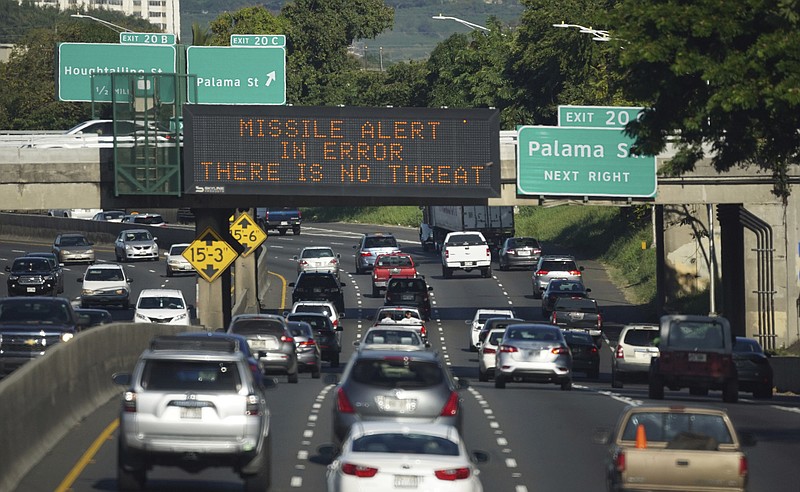Imagine your state of mind. Nuclear alert sirens all over town are wailing. Your cellphone and the Interstate sign ahead are on fire with alarms of an incoming ballistic missile. The warnings catapult your heart into your throat.
"Seek immediate shelter. This is not a drill."
Imagine the next 10, 20 or 38 minutes - the rest of your life, or until the alert is found to be mistaken and cancelled. You must decide what to tell your child. You wonder where and what exactly "shelter" might be. You try to think what to say when you call your mom for what likely will be the last time. It would, undeniably, be the worst minutes of your life.
We don't have to imagine being worried (and growing more worried) about our nuclear codes resting in Donald Trump's impulsive hands. Widespread American concern about our president's stability appears only to have made him want more nukes at his disposal - and with far fewer built-in restraints.
Earlier this month, The Huffington Post got its hands on the draft of a new Pentagon plan that expands the scope of U.S. nuclear retaliation. The draft, recently sent to President Trump for approval, would permit the use of nuclear weapons to respond to a wide range of devastating but non-nuclear assaults, including cyberattacks.
Who could possibly think this is a good idea? Our last three presidents have pushed away from nuclear weapons, threatening "first use" of them against enemies in only very narrow and limited circumstances, such as in response to the use of biological weapons against the United States.
The Huffington Post terms the draft, named the 2018 Nuclear Posture Review, "new nukes, for no good reason."
Penned by Trump's Department of Defense, the review cites U.S. national security threats, including Russian and Chinese nuclear advances as well as ones by North Korea and, potentially, Iran. A final version is expected in February.
The Armageddon prologue follows on the heels of an October report on NBC that Trump told a gathering of high-ranking national security leaders "he wanted what amounted to a nearly tenfold increase in the U.S. nuclear arsenal."
The Nuclear Posture draft doesn't go that far, but it does call for the development of new, so-called "low-yield" nuclear weapons - warheads with a lower explosive force. The theory is that neither we nor other world powers would think smaller nuclear bombs "too deadly" or self-deterring to use.
But The Huffington Post posits: "'Low yield' suggests a softer sort of weaponry, diet nukes, until you realize that the bombs dropped on Hiroshima and Nagasaki were technically 'low-yield' weapons."
The draft, instead, refers to "low-yield" weapons as "supplements" that will "enhance deterrence."
Never mind that America already has at least 4,000 nuclear weapons in our arsenal, with more than 1,000 nuclear warheads that offer low-yield options.
The George H.W. Bush administration cut our nuclear weapons stockpile by nearly 9,500 warheads. The George W. Bush administration cut the stockpile by more than half, down to roughly 5,000 warheads. President Barack Obama, in his first year in office, talked of "America's commitment to seek the peace and security of a world without nuclear weapons."
Not Donald Trump. He's the guy who wondered aloud on the campaign trail, "If we have nuclear weapons, why don't we use them?" He's the president who recently tweeted of North Korean leader Kim Jong Un: "I too have a Nuclear Button, but it is a much bigger & more powerful one than his, and my Button works!"
Steven Buser, a clinical psychiatrist and a former major in the United States Air Force, wrote Wednesday in a New York Times op-ed that one of his Air Force responsibilities was evaluating the mental stability of airmen who handled nuclear weapons, using standards laid out in what is called the Nuclear Personnel Reliability Program - PRP, for short.
"There is no need to justify why our military would take every precaution necessary to ensure that the men and women in uniform handling nuclear weapons were fit to do so, whether they were in charge of a missile silo or loading nuclear bombs onto aircraft - or giving the orders to them, on up the chain of command," Buser wrote. "Strangely, the commander-in-chief, the one who would decide when and how to use those weapons, is the only individual in the chain who is not subject to the ongoing certification under the program."
Despite a White House physician recently giving the president a clean bill of health, Buser wrote that if President Trump was Airman Trump, "warning signs abound." Buser ticked off those red flags: regular displays of erratic emotions, cyberbullying on Twitter, repeated untruthful or highly distorted statements, Trump's own language about sexually abusive behavior, paranoia about being surveilled or persecuted, frequent disregard or violation of others' rights.
"These are the sorts of things that set off alarms for Air Force psychiatrists. I certainly could not certify him as 'PRP ready' without more extensive psychological evaluation," Buser wrote. He advocates legislation that explicitly prevents any president from initiating a nuclear first strike without Congressional approval.
Hawaii's incoming ballistic missile alert that terrified millions of Americans wasn't our first wake-up call.
Try to imagine, with hope, that it will be only one we need.
